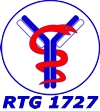Associated TP14: Analysis of pathogenic and development of therapeutic Collagen VII and XVII-specific IgGs
Today autoimmune diseases of the skin such as Epidermolysis bullosa acquisita (EBA) with IgG autoantibodies against collagen VII und bullous pemphigoid (BP) with IgG autoantibodies against collagen XVII are treated by inhibiting the whole immune system with several side effects such as infections. The aim of this project is to develop novel strategies to treat these diseases antigen-specifically, comparable to the treatment of allergic patients by allergen-specific immune therapy (hyposensibilization).Recently, it was shown that the presence of antigen-specific IgG serum antibodies is not sufficient to predict the inflammatory quality of an immune response because the IgG Fc N-glycosylation pattern determines their pro- or anti-inflammatory effector function (Anthony et al., 2008, Science and 2011, Nature; Kaneko et al., 2006, Science; Oefner et al., in press). Inflammatory IgGs are low-sialylated e.g. IgG autoantibodies in patients with rheumatoid arthritis (Scherer et al., 2010, Arthritis Rheumatism) whereas sialylated IgG antibodies have anti-inflammatory properties and underlie the immunsuppressive effect of intravenous immunoglobulin (IVIG; pooled serum IgG from healthy donors) therapy (2 g/kg). We could show recently that tolerance induction with T cell dependent (TD) protein antigen without inflammatory co-stimulus induces anti-inflammatory sialylated IgGs whereas TD antigens with TLR co-stimulation induce a full-blown inflammatory T and B cell immune response with inflammatory low-galactosylated and low-sialylated IgGs (Oefner et al., in press). We further could show that antigen-specific sialylated IgGs can be used to inhibit an inflammatory immune response in an antigen-specific manner (Oefner et al., in press).First we want to analyze the Fc glycosylation pattern of inflammatory XVII-specific serum IgGs of BP patients to investigate whether these IgG autoantibodies are similar glycosylated as compared to arthritis patients.Secondly, we want to clone and produce differentially glycosylated collagen VII- and XVII-specific monoclonal IgG subclasses to investigate their inflammatory or anti-inflammatory potential and effector functions in EBA and BP mouse and human models.The aim of the project is to understand the development of these autoimmune diseases in the context of IgG Fc glycosylation and to develop novel therapeutic strategies to treat autoimmunity.

- Projects
- Projects
- Associated projects
- MD projects
- Associated MD projects
- Concluded projects
- Concluded TP
- Concluded Ass.TP
- associated TP1 - Immunoadsorbtion
- associated TP2 - Breg
- associated TP3 - Osteoimmunology
- associated TP4 - Cytokines in EBA
- associated TP5 - Scaring alopecia
- associated TP6 - Diet and Autoimmunity
- associated TP7 - QTL in RA
- associated TP8 - Systems biology
- associated TP9 - Microbiome
- associated TP10 - Wound healing in EBA
- associated TP11 - Novel BP model
- associated TP12 - Anti-p200 pemphigoid
- associated TP13 - miRNA expression patterns
- associated TP14 - therapeutic Collagen VII and XVII-specific IgGs
- associated TP 15 - Bioactive lipid mediaters
- associated TP 17 - The role of mitochondrial DNA
- associated TP 18 -Pathogenesis of pemphigoid diseases
- associated TP 19 - New neutrophil inhibitors
- associated TP 20 - Glycosylated antibodies & autoreactive B cells
- associated TP 21 - Glycosylated IgA
- associated TP 22 - Neuronal auto-antigens
- associated TP 23 - Neuroinflammatory autoantibodies
- associated TP 24 - T cell repertoire
- associated TP 25 - Nutrition in EBA
- associated TP 26 - Circadian clocks in EBA
- associated TP 27 - Pemphigus characterization
- associated TP 28 - Mast cells in BP
- associated TP 29 - IL-10 in EBA
- Concluded MD TP
- Concluded Ass. MD TP






